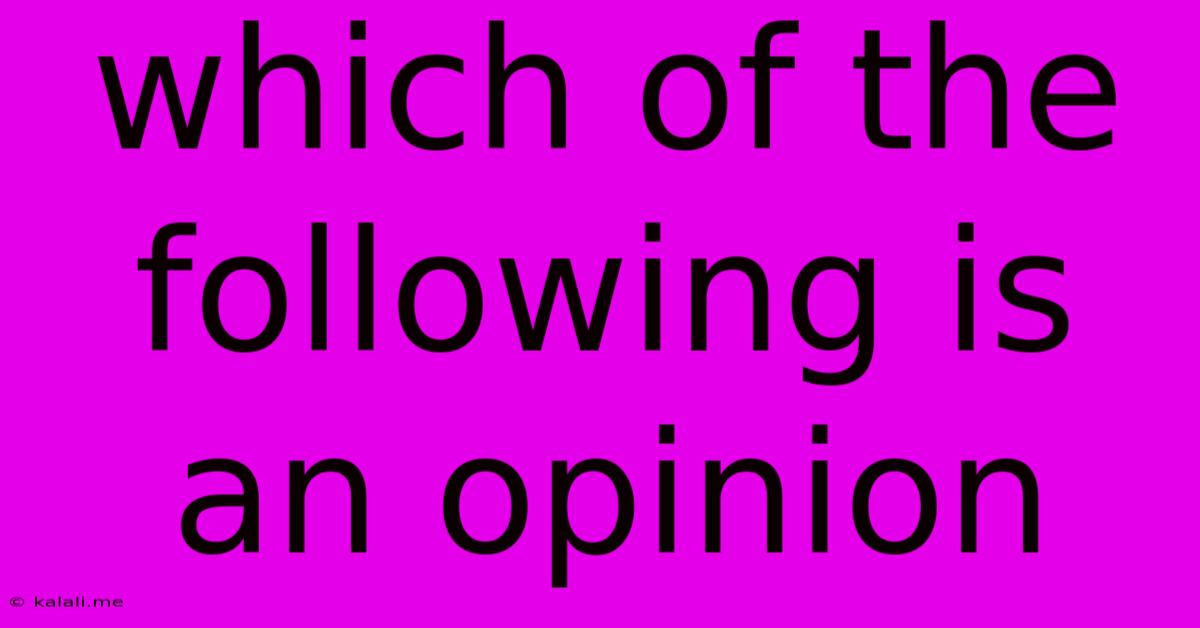Which Of The Following Is An Opinion
Kalali
Jun 13, 2025 · 3 min read

Table of Contents
Which of the Following Is an Opinion? A Guide to Identifying Subjective Statements
Determining whether a statement is a fact or an opinion is a crucial skill in critical thinking and effective communication. This article will guide you through understanding the difference, providing practical examples, and helping you confidently identify opinions within a given set of statements. Knowing the difference is vital for academic writing, respectful discussions, and navigating the ever-increasing flow of information online.
What is a Fact?
A fact is a statement that can be proven true or false through objective evidence. It's based on verifiable data and is generally accepted as reality. Facts are not influenced by personal feelings or beliefs.
- Examples: The Earth is round. Water boils at 100 degrees Celsius at sea level. The capital of France is Paris.
What is an Opinion?
An opinion is a statement that reflects a person's feelings, beliefs, or judgments. It's subjective, meaning it's based on personal perspectives and cannot be definitively proven true or false. Opinions can be supported by reasons and evidence, but they don't inherently possess the same objective verifiability as facts.
- Examples: Chocolate is the best flavor of ice cream. Cats are better pets than dogs. Reading is more enjoyable than watching television.
Identifying Opinions: Key Characteristics
Several clues can help you distinguish opinions from facts:
- Subjective Language: Look for words that express feelings, beliefs, or judgments, such as "best," "worst," "should," "ought," "believe," "think," "feel," "in my opinion."
- Value Judgments: Opinions often involve making value judgments, assigning worth or merit to something.
- Lack of Verifiability: If you can't prove a statement true or false using objective evidence, it's likely an opinion.
- Personal Experiences: Opinions are often rooted in personal experiences and perspectives, making them unique to the individual.
Examples: Fact vs. Opinion
Let's analyze some examples to illustrate the difference:
-
Statement: "The Mona Lisa is a masterpiece."
- Analysis: This is an opinion. While the Mona Lisa is a famous and historically significant painting, calling it a "masterpiece" is a subjective judgment based on aesthetic preferences. There's no objective standard to definitively prove this claim.
-
Statement: "The Mona Lisa was painted by Leonardo da Vinci."
- Analysis: This is a fact. Art historical records and analysis of the painting confirm Leonardo da Vinci's authorship.
-
Statement: "Shakespeare's plays are boring."
- Analysis: This is an opinion. Whether or not someone finds Shakespeare's plays engaging is a matter of personal taste and preference.
-
Statement: "Shakespeare wrote Hamlet."
- Analysis: This is a fact. This is widely accepted in the literary world and supported by historical evidence.
Conclusion:
Differentiating between facts and opinions requires careful consideration of the language used and the presence of objective evidence. By understanding the key characteristics of each, you can critically evaluate information, engage in more productive discussions, and improve your own writing and communication skills. The ability to discern fact from opinion is a valuable tool in today's information-rich world, enabling you to navigate the complexities of information and form informed judgments.
Latest Posts
Latest Posts
-
Milk Of Magnesia Acid Or Base
Jun 14, 2025
-
Application Of Matrix And Determinants In Real Life
Jun 14, 2025
-
Which Is The Largest Fraction 3 4 7 8
Jun 14, 2025
-
The Three Regions On A Pressure Enthalpy Chart Are
Jun 14, 2025
-
Reaction Of Iron With Hydrochloric Acid
Jun 14, 2025
Related Post
Thank you for visiting our website which covers about Which Of The Following Is An Opinion . We hope the information provided has been useful to you. Feel free to contact us if you have any questions or need further assistance. See you next time and don't miss to bookmark.